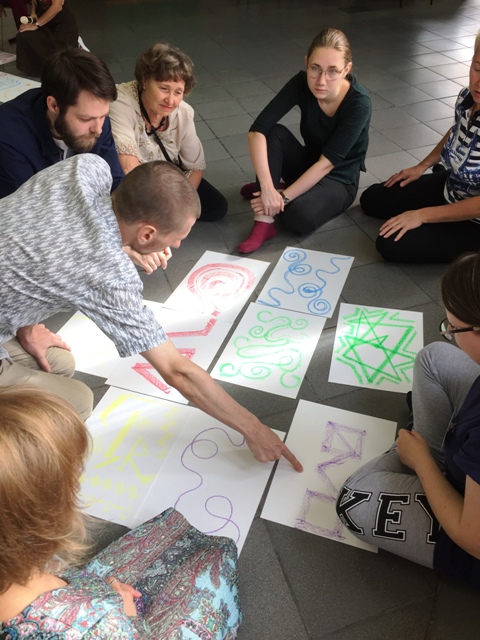The start of a new Level Course in Russia Verena Maschat
In August, even in Siberia is summer. The climate during the first phase of the level course in the capital Novosibirsk was very pleasant, both outside and within the group. During ten intensive days (15-24 August, 2017), 37 participants from 23 cities of Russia and Ukraine started a journey that will take them through five phases within two years and 270 hours of hands-on experience with Orff-Schulwerk, reflection and teaching practice.
Thanks to the financial help of the IOSFS, a curriculum session could be organized in St. Petersburg (January 3/4) to coordinate the entire course. A special curriculum was designed in collaboration with our Russian colleagues responding to the reality in Russian schools and the necessities of further training of Russian teachers. As contemplated in the Recommendations and Guidelines for Level Courses of the IOSFS (which have been elaborated after the experience of the first Russian Level Course), those were modelled to the current syllabus for the different target groups.
Under the direction of Irina Shestopalova, president of ROSA (Russian Orff-Schulwerk Association) and in collaboration with the State Academy of Postgraduate Education in Volgograd, five Russian teachers with extensive training in Orff-Schulwerk and experience in teacher training guarantee the continuity during all five phases. Some of them have completed the first Russian Level Course, others have studied at the Orff Institute Salzburg. A representative from the Orff Institute will be teaching the morning sessions during the remaining two summer phases.

In this Phase I, my intention was to create a sound basis for the entire course, achieve a positive feeling within the group and provide basic knowledge in all areas of the curriculum. I dedicated the morning sessions with the whole group to giving participants the opportunity to experience the core content of Orff-Schulwerk practically and reflect about aspects of content, sequence and didactic steps at the end of each session.
Special attention was given to social and emotional aspects (get to know and appreciate each other, foster trust in oneself and within the group); create a safe space for exploration and improvisation; the unity of music, dance and speech; creative aspects (exploration, improvisation and elemental composition); teaching models for vocal, instrumental and movement work; basic knowledge about the origin and pedagogical ideas of Orff-Schulwerk.
For the afternoon workshops participants were divided into two groups and worked alternatively with Irina Shestopalova and Slava Zhilin on the following themes: Speech and song; elemental dance forms (fixed and free); instrumental practice (body percussion, small percussion instruments, first introduction to the barred instruments and the recorder); elemental arrangement; didactics of Orff-Schulwerk in Kindergarten and Primary School.
I am very grateful to Natasha Shestopalova for the translation of my sessions and all her help during my stay. Also to the Carl Orff Foundation for the grant to purchase instruments and to STUDIO 49 for financial help as well as advice and assistance with transport formalities.
The little I could experience during my short stay I found everything more open, more modern than 10 years ago when I last taught in Moscow. Thanks to the careful organization of Irina providing excellent facilities for thedevelopment of the course, this second Russian Level Course hopefully will be easier than the pioneer one my colleagues started in 2002.
